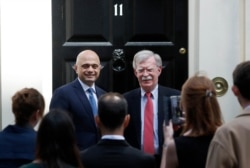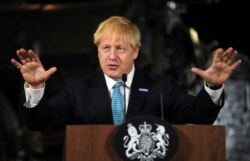U.S. Democratic party lawmakers are threatening to kill any free trade deal Britain strikes with the Trump administration, if a post-Brexit border is re-established across the island of Ireland. They argue a so-called "hard border" threatens a peace agreement the U.S.-brokered in the 1990s, which ended three-decades of violence in Northern Ireland.
The warnings from senior Democrats come just days after President Donald Trump’s national security advisor, John Bolton, said Britain would be the first in line for a fast-tracked free trade agreement with the United States when Britain leaves the European Union.
In a letter Monday to U.S. Secretary of State Mike Pompeo, Senate Minority Leader Chuck Schumer said he’d join both Democratic and Republican counterparts in the House of Representatives in “vigorously and vociferously” opposing any free trade deal, if post-Brexit customs checks are re-established on the border separating Northern Ireland from the Irish Republic, which is an EU member state.
During a visit last week to London, Bolton said Trump was enthusiastic about a trade deal. Earlier this month, Pompeo told visiting British Foreign Secretary Dominic Raab that the Trump administration will be ready, “pen in hand,” to sign “a new free trade agreement at the earliest possible time” after Britain breaks with the EU.
Prime Minister Boris Johnson has pledged to lead Britain out of the EU without any deal on Oct. 31, come what may, deal or no deal. Irish-American U.S. lawmakers say if that promotes the re-emergence of a border on the island of Ireland, it would prevent him from striking a trade deal with the U.S. — at least one that gets the seal of approval on Capitol Hill.
The question of what happens when Britain leaves the EU has been the thorniest issue for British and European politicians to confront. At present, goods and services are traded between the Irish Republic and Northern Ireland with few restrictions. The border, which snakes for almost 500 kilometers from Lough Foyle to Carlingford Lough, exists in name only, passing through a bucolic landscape.
But that could change on October 31, upending the 1998 Good Friday Agreement, an accord which brought peace to Northern Ireland after decades of deadly sectarian strife, known locally as "The Troubles," between Catholics and Protestants in Northern Ireland. More than 3,000 people died in "The Troubles.”
Britain agreed also to remove checkpoints and infrastructure along the border under the accord, which was brokered by the Clinton administration and signed by London, Dublin and most political parties and armed factions in Northern Ireland.
In an original Brexit withdrawal agreement struck between London and Brussels last year, Britain would have remained in the EU’s customs union for an indefinite period while a free trade agreement was being negotiated in order to a avoid a "hard border" being reimposed across the island of Ireland. And Northern Ireland would have remained closely aligned with EU product regulations.
But the Brexit withdrawal agreement negotiated by then-British Prime Minister Theresa May and the EU was rejected three times by the House of Commons. And May’s successor in Downing Street, Johnson, has said the plan to avoid a hard Irish border, known as the backstop, is now dead. On Monday, he wrote to EU negotiators saying the idea of the backstop would have to be scrapped, earning a sharp rebuff from Brussels and Dublin.
The border is a matter of great political, security and diplomatic sensitivity on the island of Ireland and the possible reappearance of customs checks and guardhouses is prompting fears of a backlash by violent republicans who want Ireland to be unified.
On Monday, those fears were heightened when dissident republicans were blamed for a bomb blast in Northern Ireland near the border in the county of Fermanagh. Northern Ireland’s deputy chief constable, Stephen Martin, said Tuesday that the perpetrators had tried to lure police officers to their deaths by planting a hoax device and then triggering a real bomb.
There have been five attempts to murder police officers so far this year, he said, adding there is a sense that the situation in Northern Ireland is becoming “more entrenched.”
In his letter Monday, Schumer urged the Trump administration to “stop over-promising an unconditional and unrealistic post-Brexit trade agreement with the United Kingdom.” Trade deals are negotiated by the White House, but they have to be approved both by the House of Representatives, where Democrats have a majority, and the Senate, where Republicans hold a majority.
The burgeoning opposition on Capitol Hill to a free trade deal with Britain is being driven, say congressional aides, by the sharp disapproval of Brexit by Irish-American constituents along the east coast of the U.S., where their backing can swing the outcome of congressional elections in some key districts.
The Irish-American lobby has shown in the past that it has the ability to out-maneuver the British government in Washington when it comes to congressional politics. During the negotiations over the Good Friday Agreement, the British found themselves put in a difficult position by Dublin and Irish-American lawmakers on some crucial issues.
In the run-up to negotiations, the British thought they had managed to block Irish Republican leader Gerry Adams from securing a visa to visit the U.S., only to find the Clinton administration granting him one following the intervention of Irish-American lawmakers. Then-British Ambassador Robin Renwick complained to British reporters that he had been promised that would not happen while playing tennis with one of President Bill Clinton’s top national security advisors.
Last week, in the wake of Bolton’s visit to London, Nancy Pelosi, the speaker of the House of Representatives, issued an unequivocal statement, cautioning, “If Brexit undermines the Good Friday accord, there will be no chance of a U.S.-U.K. trade agreement passing the Congress.” Her aides say she would block the trade deal from even coming to the floor of the House for a vote, if the border re-emerged.









